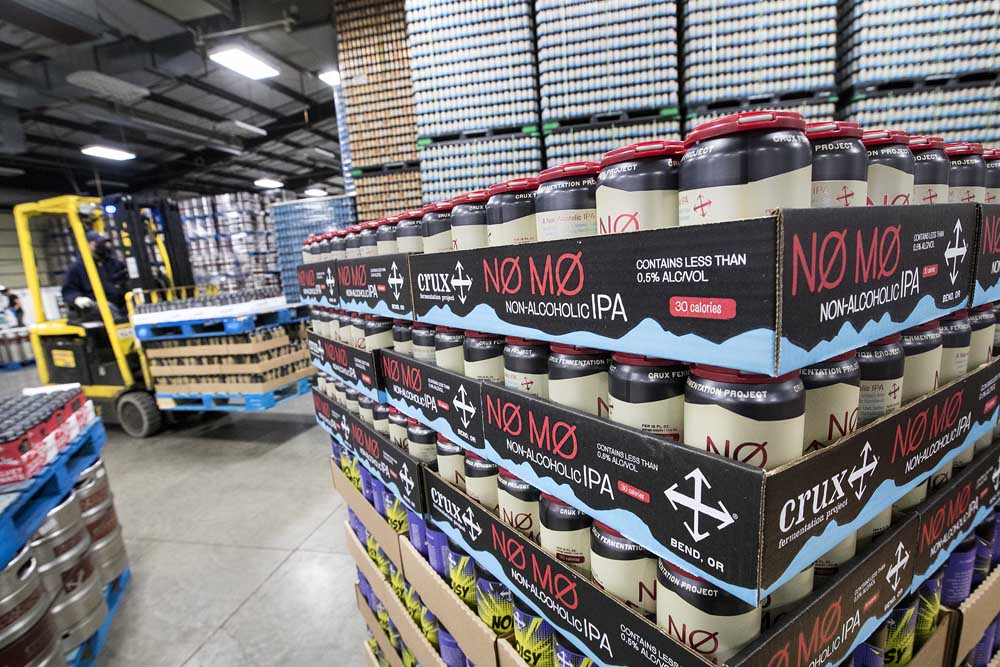Bend brewers tap into nonalcoholic beer market
Published 3:45 pm Thursday, January 27, 2022

- Employee Will Klein drives a forklift near a stack of NØ MØ Non-Alcoholic beer at the Crux Fermentation Project production facility in Bend on Thursday.
It has taken several decades, but nonalcoholic beers are starting to be accepted by mainstream beer drinkers. And fans of “near beer” don’t need to look to the mega beer factories for a six-pack sans alcohol — local producers have started rolling them out right here in Bend.
Deschutes Brewery announced last week that it will start nationwide distribution of its new Black Butte Non-Alcoholic, a dark beer modeled after its popular Black Butte Porter. The beer will be on grocery store shelves across the country by March and is already available at the Deschutes pubs in Bend and Portland.
Across town, Crux Fermentation Project has been selling its NØ MØ nonalcoholic beer in stores since June.
Company founder Larry Sidor said consumer support has “been impressive” so far, with sales spikes during what he called “Sober October” and “Dry January.”
What is behind the sudden gain in popularity of nonalcoholic beers, 103 years after they first appeared in the United States? Many beer industry analysts point to improved taste of nonalcoholic beer, combined with pent-up demand for a low-calorie adult beverage.
There are other advantages too. Beer drinkers are discovering that nonalcoholic beers are acceptable in the workplace, or before getting behind the wheel to drive home.
Veronica Vega, director of product development for Deschutes Brewery, said health-conscious drinkers have been a main driver of demand.
“It’s so similar to the real thing that people are often surprised that it’s nonalcoholic,” said Vega.
Bart Watson, chief economist for the Craft Brewers Association, a nonprofit trade association, said in addition to “wellness considerations” the nonalcoholic category is also getting a boost by more flavorful products.
“The (nonalcoholic) market used to be defined primarily by the lack of alcohol,” Watson wrote in an email. “Today flavor is an equally important component for many (nonalcoholic) customers.”
When considering what direction it wanted to go in terms of taste, Deschutes wanted to take a different approach, avoiding the light beers already on the market. Vega said with Black Butte Non-Alcoholic coming to market, beer drinkers won’t have to “settle for light beers.”
Both Crux and Deschutes said they each plan to produce about 3,000 barrels of nonalcoholic beer this year.
Black Butte Non-Alcoholic is not the first nonalcoholic beer for Deschutes Brewery. In 2020 the company released a nonalcoholic Irish-style dark beer on a limited basis. That beer won a silver medal at the U.S. beer championships in the nonalcohol stout category, and also earned the Country Winner Award at the World Beer Awards.
At Crux, Sidor said his decision to produce a nonalcoholic beer was more of a personal challenge rather than a business decision.
“I’ve made millions of cases of nonalcoholic beer beginning in the 1980s. They were all very nasty, and I was looking for redemption from the folks who consumed them,” said Sidor. “Personally, I love beer and want the option to choose the amount of alcohol I consume.”
Bend residents have joined the trend of buying up nonalcoholic beer, said Robert McCarthy, beer and wine manager for Newport Avenue Market. He noticed an uptick in sales this month. The lower calories are just one of several factors driving sales, he said.
“Athletes and others like the taste and flavor of nonalcoholic beer but without the calories or associated buzz,” said McCarthy. “Local breweries have also jumped on the trend and are brewing their own and we know how people love their local.”
A similar trend can be found across the Pacific Northwest. Leon Matlock is the assistant liquor sales manager for Safeway and Albertsons, in Oregon and southern Washington. He said nonalcoholic beer is the fastest-growing segment in the beer category, with sales up 18% from six months ago, and nearly 33% from one year ago.
Matlock said in addition to being a healthier alternative to regular beer, “beer fatigue” may be setting in after the early days of the pandemic, when households were consuming larger amounts of beer while under quarantine.
”(Nonalcoholic) beers are getting better and better at giving customers what they need, and some are just as good, if not better than a traditional beer,” said Matlock. “We are seeing a surge in some of our local craft partners entering this category.”
Matlock highlighted the Crux NØ MØ as a particularly good seller.
“We will be stocking more (nonalcoholic) beers going forward.It is absolutely a category that we want to continue to grow and make Safeway and Albertsons a destination for,” he said.
While the new Deschutes nonalcoholic beer seems novel in Bend, Watson said the nonalcoholic beer trend has already caught on with some of the world’s largest beer makers. Heineken, Guinness and Budweiser have recently started producing nonalcoholic beer linked to their best-known labels.
“In the past, they created new brands to make sure there wasn’t a direct association, and now they are rolling out (nonalcoholic) versions of their flagship brands.”
Still, nonalcoholic beer represents just 0.5% of the total beer sold in the U.S., up from 0.3% in 2018, said Watson.
“It’s growing, but from a very small base,” he said, adding that he is part of the nascent army of nonalcoholic beer buyers.
“I think I’m typical of where the growth is coming from,” said Watson. “Some of those occasions are on nights when I’m not drinking because I am working or parenting, and at times I’ll mix in (nonalcoholics) in between alcoholic beers.”






